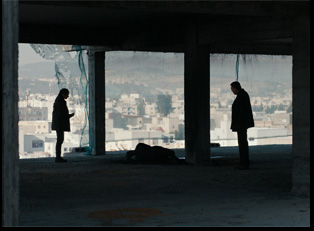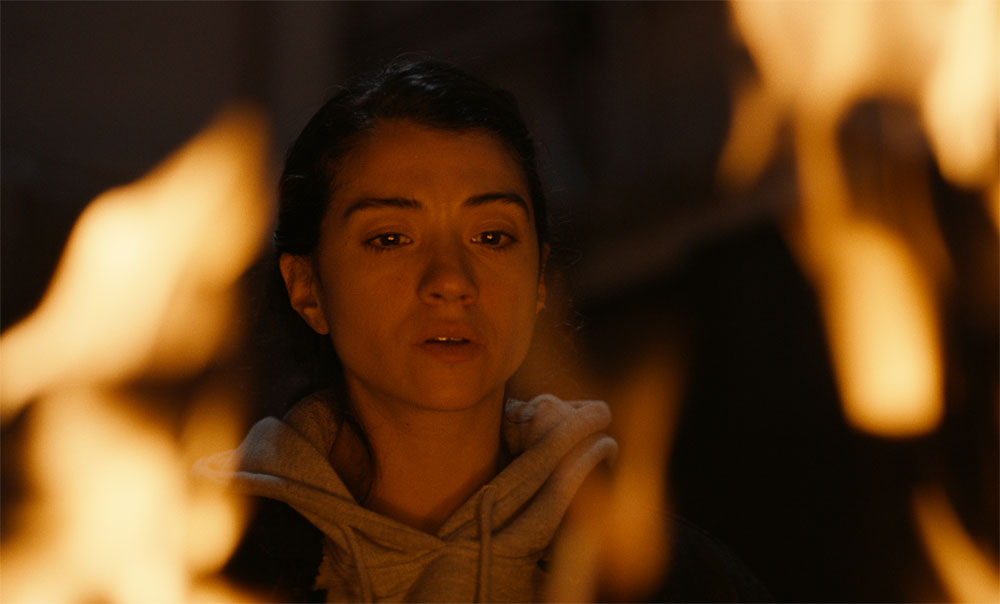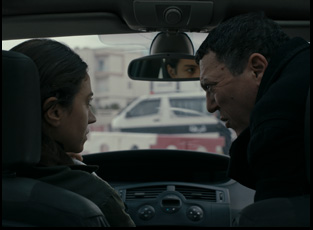In spite of all the unfinished buildings one can see at the start of “Ashkal: The Tunisian Investigation” — abandoned and half-built when the Arab Spring inspired revolution in Tunisia and led to the overthrow of President Zine El Abidine Ben Ali, who had himself assumed power in a coup and fled to Saudi Arabia after accusations of plundering the country of its wealth while doing nothing to improve the lives of those living in poverty — there are structures that remain as imposing as ever and writer/director Youssef Chebbi knew he’d have to find a unique way to capture them on film. Although Ben Ali’s government was deposed, sympathizers remained in the police force and in an area once designated for urban development called the Gardens of Carthage, even if the skyscrapers intended for the wealthiest members of society were half-built, they loom large in the public’s imagination when they are all but impossible to destroy and build something new atop of and yet remain as a reminder of even bleaker times.
Though they’ve remained in the city they were born into as many others left, investigators Fatma (Fatma Oussaifi) and Batal (Mohamed Grayaâ) have trouble finding their footing in this new reality, tasked with finding the cause behind a series of deaths that may be the work of a serial killer or could also be suicides when they’re uncovering charred bodies that autopsies suggest weren’t self-inflicted but also show no signs of foul play when there’s no flammable material can be found around them. In a religious community, the supernatural can’t be entirely ruled out by some, but Fatma and Batal contend with the facts in front of them, though they can’t help but feel as if they’re chasing ghosts when they can be tripped up by the internal politics of their own department where some superiors remain loyal to the previous regime, disgusted by the ongoing truth and dignity commission that’s been launched to look into crimes of the state and barely hiding their disdain for Fatma’s father, a key figure in that movement.
As ugly a situation as the two detectives find themselves in, Chebbi frames them in often breathtaking compositions, standing firm in a crumbling world where the exposed skeletal remains of high-rises can appear as confines or escapes depending on how one looks at them — or as Chebbi recently explained to me, how they look at you. Taking a fascinating approach to a murder mystery, perspective shifts throughout “Ashkal: A Tunisian Investigation” to reflect a society that has become fragmented and doesn’t necessarily share a foundation of truth to operate from, yet Fatma and Batal are aligned in their pursuit to get to the bottom of things, even if it stems from different interests. The film has been leaving audiences haunted since its premiere last year at Cannes Directors Fortnight, and has now arrived on U.S. shores where Chebbi accompanied it this week for its theatrical run and graciously took the time to talk about how the film was informed by a sense of place, capturing a feeling that a documentary treatment of this area could not, and engaging the local community to make the film with him.
Everything started when I discovered this place because my mother was building her house in this strange neighborhood. It was in 2017 and the first time that I saw this this neighborhood, I was just walking around, taking some photographs and after a few walks, I I was really convinced that it’s possible to shoot a film there. It could be a kind of open air studio with all these vacant buildings and has also something very strange that was exciting to film.
Was it actually that easy to set up and film there ultimately? It appears that you have the full run of the place.
No, we had a lot to do to film there. For scouting, it was okay. You can just talk with the people who are working there, but when it’s official and you come with the cinema crew and [our] producers had to get authorizations, and it was very difficult because a lot of these buildings were stopped [from development], so the owners fled Tunisia after 2011, because this place was really linked to the power at that time, or they are in prison, and to find them [and obtain] authorization for some spots was really difficult. But they did a great job and we managed to shoot in most of the chosen locations.
It seems like the geography factors into the film so much, not only in terms of how shots are composed, but the rhythm of the film when you’ll often have characters walk or drive so you really get to take in the background behind them. How did it inform making this?
Yeah, the mise-en-scene was supposed to match this feeling of walking around the neighborhood. That’s why there are these steady shots where the characters can get lost inside the frame, but also where it’s like patient enough to see how also the light can change inside the shot. Because of course, it’s a city, but sometimes it’s a city eaten by nature — there are a lot of trees and a lot of dogs everywhere, so we wanted also to give this feeling of this abandoned and post-apocalyptic city and we let the shots show different lights and how the light shapes the landscapes. The idea was to give a point of view to the buildings themselves, to sometimes shoot something from inside the buildings and it ends up on the streets, so we don’t know exactly who is looking. There is no character or a physical body, and this is what we feel when we work in this area — we feel that the buildings are like following us or looking at us, so it was important to put this feeling in the film.
Is it true those are real workers you see engaging with the investigators in the film?
I would’ve loved to do it more, but it wasn’t so easy because we didn’t find that many workers in this area. We shot like two years ago now, and at the time, most of the building was stopped but the ones who were working there, we went every morning asking them if they want to make a scene with us, and it was really great to be accepted [into the community]. We shot 30% of the film there, and this idea of making it as an open-air studio wasn’t possible without the people living there, so they helped us a lot. And for me, it was important to include them in the film, even if we treat them a bit as ghosts, because there are not so many [people living there] and sometimes they spend so much time in these vacant buildings, they began [to resemble] ghosts living in these places, so it was important to involve them, but not through a social or realistic point of view.
You’ve got these two fine actors in this film as well. How did they come onboard?
Yeah, Fatma Oussaifi is a tango dancer, and I met her in 2016. I was looking for an actress for a film and I wanted to work with Fatma, but we didn’t manage to make the film, but I really was thinking about her since then and I made my first short with Mohamed Grayaa more than 10 years ago, and Mohammed is really, for me, one of the best actors that we have. He’s very sensitive and intelligent. He doesn’t only see his own performance, but really all the scene and it always pushes his partners, so both of them became friends during the shooting and they they really created this duo of Fatma and Batal.

No, you cannot really find them in the Tunisian police but the idea wasn’t to create a realistic portrait of what is happening now in Tunisia. It’s more about exploring the imaginary landscape of Tunisia, trying to start from the reality that we know — the political layers and the social [issues] — and try to stretch them to go somewhere else, in a more fantastical or mystical dimension. For me, the characters are opposite, but also they compete each other because so Batal is really this witness of what happened during the Ben Ali times and how now because he lost his system, he’s very fragile and and he tries his best to change. And Fatma is more close to these vacant buildings where she feels that the answer is there in this modern temple. It’s not in the pursuit of the truth as we see with the commission or what the police are doing. She thinks that there is something else, that it’s deeply hidden inside these buildings, so [the combination of these two people] help us to understand what’s happening in the reality, but also in the deep imaginary landscape of the country.
This is one of those films that is well-aware of using genre conventions to subvert them. Was it interesting to lean into certain narrative tropes?
Yeah, mixing stuff together also creates something I wasn’t really aware of because I wanted to work on this layer of reality, but it wasn’t enough for me, so I wanted to bring something else. For example, I wasn’t sure about the motive of self-immolation in the beginning, but I was sure that I wanted to shoot this film in this locations, and I was looking for something that contrasts with the concrete of the buildings. When you read about the story of the country, and of this neighborhood, you understand that the city stopped [developing] because the revolution started and the revolution started because of this young man who set himself on fire. So in the beginning, I thought it was interesting to bring both motives — this concrete city and this body on fire — but I didn’t want to explore it only through a [strictly] political or social lens. Of course, it can be true, but it’s not enough. It’s [a feeling] so strong that we cannot just simplify it saying it’s politically like this. So when I was like searching around this motif of self-immolation, at some point in the research, you can feel that there is another layer [that’s] religious, spiritual, mystical, or even fantastical, and it was interesting how what we see as only as a political image can also be something so much more. When I found this dimension, I said, “Okay, now we can work on it,” because now you can interpret it from different points of views and that’s mainly what we tried to do in the whole film.
Even though you had a wealth of experience going into this, was a narrative feature something different for you?
It was. It was the first time that I made a film in the classic way with a classical crew and we had only a few [weeks to film], and then you have all the editing and the post-production, so the rhythm was already something different for me because I’m used to working in a more free [way] where you take the camera and you go and shoot and you take your time to edit. But it was really interesting also to have the possibility to just keep shooting — we shot nearly two months and it was really good to be able to do it every day, to wake up and say okay now we need to find a solution for this scene and how can we make it work with what we shot before. I really enjoyed it and I would love to do it again.
“Ashkal: The Tunisian Investigation” opens on August 18th in New York at Roxy Cinema and Los Angeles at the Lumiere Music Hall. It will open on September 1st in Boulder, Colorado at the Dairy Center and September 8th in Chicago at the Music Box Theatre.





